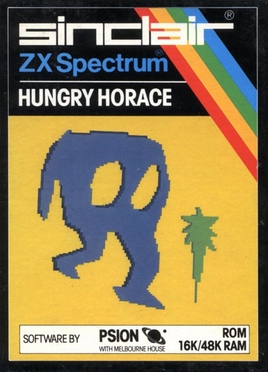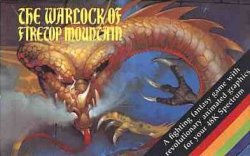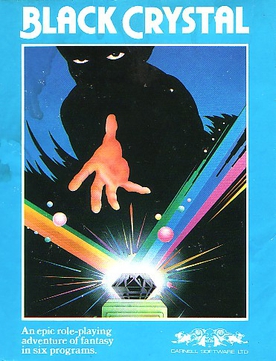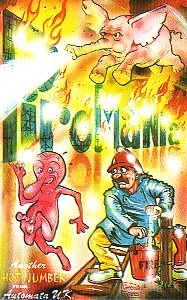
The ZX Spectrum is an 8-bit home computer developed and marketed by Sinclair Research. Considered one of the most influential computers ever made, it is also one of the best-selling British computers ever, with over five million units sold. It was released in the United Kingdom on 23 April 1982, and around the world in the following years, most notably in Europe, the United States, and Eastern Bloc countries.

3D Monster Maze is a survival horror video game developed from an idea by J.K. Greye and programmed by Malcolm Evans and released in 1981 for the ZX81 with the 16 KB memory expansion. The game was initially released by J. K. Greye Software in December 1981 and re-released in 1982 by Evans' own startup, New Generation Software. Rendered using low-resolution character block "graphics", it was one of the first 3D games for a home computer, and one of the first games incorporating typical elements of the genre that would later be termed survival horror.

Hungry Horace is a video game developed by Psion Software Ltd. and published by Sinclair Research in 1982 for Commodore 64, Dragon 32/64, Timex Sinclair 2068, ZX Spectrum, and later for Microsoft Windows and Android. It is the first game in the Horace series. The gameplay is noted to be very similar to Pac-Man, involving the collection of food pellets in a maze while avoiding enemies. Despite this, critical reception of the game was generally positive upon release.

Artic Computing was a software development company based in Brandesburton, England from 1980 to 1986. The company's first games were for the Sinclair ZX81 home computer, but they expanded and were also responsible for various ZX Spectrum, Commodore 64, BBC Micro, Acorn Electron and Amstrad CPC computer games. The company was set up by Richard Turner and Chris Thornton. Charles Cecil, who later founded Revolution Software, joined the company shortly after it was founded, writing Adventures B through D. Developer Jon Ritman produced a number of ZX81 and Spectrum games for Artic before moving to Ocean Software.

Deus Ex Machina is a video game designed and created by Mel Croucher and published by Automata UK for the ZX Spectrum in October 1984 and later converted to MSX and Commodore 64.

Bug-Byte Software Ltd. was a video game company founded in 1980 in Liverpool, initially producing software for the Acorn Atom and ZX80. Bug-Byte's first hit was Don Priestley's Mazogs which was one of the most successful titles for the ZX81. In 1983, it published Manic Miner, considered to be one of the most influential platform games of all time. The company went into liquidation in 1985 but their name and logo were purchased by Argus Press PLC for use as a budget software label.

Mel Croucher is a British entrepreneur and video games pioneer. Originally an architect, he moved into computers and in 1977 launched one of the very earliest games companies, Automata UK, as an extension of his publishing business. He is now credited for setting up "the first games company in the U.K.", celebrated as "the father of the British videogames industry" and presented as "a pioneer in affective computing". His first broadcasts of computer game software were made over AM and FM radio. After the release of the Sinclair ZX81, his label published several games for the early home computer market, including three Computer Trade Association award-winners: Pimania (1982), Groucho, and the groundbreaking "multi-media" title Deus Ex Machina (1984).
Quicksilva was a British games software publisher active during the early 1980s.
Crystal Computing, later renamed Design Design, was a British video game developer founded in 1982 by Chris Clarke and Ian Stamp while students at the University of Manchester. Graham Stafford, Neil Mottershead, Simon Brattel and Martin Horsley, joined the company as it expanded. The company's first software release was a compilation of games for the Sinclair ZX81, though it was with the ZX Spectrum that Crystal found its greatest success. A deal with the machine's manufacturer Sinclair to distribute Crystal's Zeus Assembler gave the company sufficient funds for a major marketing campaign for their next product, Halls of the Things, an arcade adventure game that became their most successful title.
The ZX Spectrum's software library was very diverse. While the majority of the software produced for the system was video games, others included programming language implementations, Sinclair BASIC extensions, databases, word processors, spread sheets, drawing and painting tools, and 3D modelling tools.
DK'Tronics Ltd was a British software and hardware company active during the 1980s. It primarily made peripherals for the ZX Spectrum and Amstrad CPC but also released video games for the ZX81, ZX Spectrum, Commodore 64, VIC-20, BBC Micro, Memotech MTX, MSX and Amstrad platforms.
Don Priestley is a teacher and former video game programmer who wrote over 20 commercial games for the ZX81 and ZX Spectrum home computers between 1982 and 1989. Despite successful releases for DK'Tronics, such as 3D Tanx and Maziacs, Priestley returned to teaching in the late 1980s, claiming changes in the video game industry did not suit his style of work.

Daley Thompson's Decathlon is an Olympic-themed sports video game developed and released by Ocean Software in 1984. It was released in the wake of Daley Thompson's popularity following his gold medals in the decathlon at the 1980 and 1984 Olympic Games. The game shares significant design similarities to Konami's 1983 arcade game Track & Field.
Automata UK was a software house which developed and published ZX Spectrum video games between 1982 and 1985. Significant releases included Pimania (1982), My Name Is Uncle Groucho, You Win A Fat Cigar (1983) and Deus Ex Machina (1984).

The Warlock of Firetop Mountain is an action game published by Crystal Computing in 1984 for the ZX Spectrum home computer. It is loosely based on the adventure gamebook of the same name written by Steve Jackson and Ian Livingstone, and published by Puffin Books in 1982.
Addictive Games was a UK video game publisher in the 1980s and early 1990s. It is best known for the Football Manager series of games created by company founder Kevin Toms. The company was originally based in Milton Keynes, England, and later relocated to Bournemouth, in southern England.

Automonopoli, also known as Go to Jail, is an unauthorised computer version of the boardgame Monopoly, released in June 1983 by Automata UK for the ZX Spectrum. Although other two-player Monopoly computer programs already existed, the developer advertised that their Automonopoli was the first with an artificial intelligence strong enough to compete against and defeat human players.

Volcanic Dungeon is a role-playing video game designed by Roy Carnell and Stuart A. Galloway and released by Carnell Software for the ZX Spectrum, Dragon 32/64 and ZX81 computers in 1983. It is a follow-up to 1982's Black Crystal.

Black Crystal is an action-adventure game released in 1982 for the ZX81, ZX Spectrum, Commodore 64 and TI-99/4A computers by Carnell Software Ltd. It was the first in the "Third Continent Trilogy" of adventure games; followed by Volcanic Dungeon and The Wrath of Magra.

Piromania is a 1984 platform game published by Automata UK for the ZX Spectrum. Strange Loop previously published the game as Infernal Combustion.














